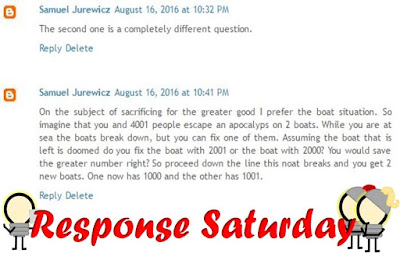The thing is, both my problem (the second one, at least) and the boat problem have hidden third choices. "Take a third option," if you will.
But let's talk about the first problem, the one that initiated last Tuesday's post.
Of course, there's a chance the five people tied to the tracks are the modern equivalents of Hitler, Caligula, Attila the Hun, Ivan the Terrible, and Vlad the Impaler, while the one person could be the modern equivalent to Nelson Mandela. The SMART move would be to not pull the lever, thus killing the five monsters, but what if my decision to save them prompted them to turn their lives around and become forces for good? There's just no way to tell.
And what if everyone was a stranger except for one of the five, who just so happens to be my worst mortal enemy? Would I stay true to my initial decision to save as many people as possible, or would my hatred for my worst enemy come out on top?
I thought this question was easier to handle.
So the trolley is coming, and I have the choice to throw the fat man over the side of the bridge to stop the trolley and save the rest of the people.
The thing is, the 'heavy weight' described in the initial problem is a pretty ambiguous term. Maybe the fat man is heavier than me, but I'm 200 pounds. I can't even bench that much, so I would consider myself a heavy weight.
And let's be honest. It's not easy to just push a fat guy over. If I grabbed this dude and tried to throw him overboard, he'd probably resist, and then what? Now nobody gets saved.
So why not just jump off the bridge myself?
Now, on to the boat problem presented via the text of a picture at the beginning of the post.
For one thing, I think the problem contains a logical error. If one boat breaking down can be turned into two smaller boats that can contain the same amount of people (which I'm not sure is possible on the high seas), why can't two boats breaking down be turned into four smaller boats? In addition, if everyone on the boat is using up supplies, then the boats would actually gain more space as time went on. As it is, for the sake of this blog post, I'm not going to explore the problem beyond the initial prompt.
It seems obvious to me that, as the boat's engineer, I am the extra person described. In that case, it doesn't matter which boat I fixed, I'm always going to be included in the group of 2001 people. The question then becomes, should I sacrifice my spot on the boat for someone else on the other boat, or do I stay with the original boat to keep finding ways to fix it as more issues crop up?
I think I could do the greatest amount of good by staying with the boat to possibly save more people, but let's be honest. I'm a writer, not an engineer. They'd probably throw me on the sinking ship, and I wouldn't blame them.




No comments:
Post a Comment